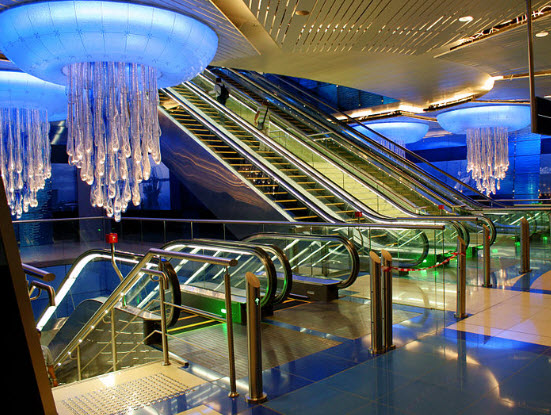
Yihaodian aims to open 1,000 virtual supermarkets throughout China
Yihaodian, a Chinese e-commerce company, has announced the opening of 1,000 virtual stores throughout China. These supermakers will inhabit empty spaces within cities, but will not have any physical products stored within. Yihaodian will make use of augmented reality in order to accomplish this task, enabling consumers to access a massive, interactive database of goods. Once completed, this will be the largest virtual shopping network of its kind in the world and could help spark similar initiatives in other countries.
Company hopes to exploit rampant popularity of augmented reality
Yihaodian is not the first company to attempt to establish a virtual marketplace in the real world. Others have made use of QR codes or NFC tags to accomplish this task in the past, but have been met with only modest and short-lived success. Yihaodian hopes to exploit the rampant popularity of augmented reality as a way to provide consumers with high quality service and ensure that the virtual supermarkets get the attention they need to become a success.
Unlimited Yihaodian stores to be stocked with digital goods
The supermarkets will be called Unlimited Yihaodian. The virtual stores will be located in 1,200 square meter rooms that will have a digital stock of over 1,000 items. Consumers will be able to see these products using a smart phone equipped with an augmented reality application. Purchases can be made using Yihaodian’s e-commerce platform, enabling consumers to skip long lines and get what they want in an efficient manner. Like other virtual stores, consumers will receive their products in the mail after purchase, usually the following day.
Yihaodian may succeed where others have failed
Yihaodian had attempted to bring virtual stores into the mainstream using QR codes. This endeavor proved informative, but largely fruitless. The United Kingdom’s Tesco had also launched a similar initiative in South Korea, where consumers were able to make use of QR codes to purchase products. This too was short-lived, with Tesco quickly taking down the virtual storefront and pursuing other avenues of e-commerce.
du plans to have consumers pay for their Metro tickets using NFC technology
Commuters in Dubai will soon be using their smart phones to purchase Metro tickers thanks to United Arab Emirates telecommunications giant du. du has seen a great need for more efficiency in Dubai’s public transportation system. As such, the company has announced its partnership with the UAE’s Roads and Transport Authority. Through this partnership, du will work to incorporate NFC technology into the country’s public transportation system, with the foundation of this endeavor being laid in Dubai.
using their smart phones to purchase Metro tickers thanks to United Arab Emirates telecommunications giant du. du has seen a great need for more efficiency in Dubai’s public transportation system. As such, the company has announced its partnership with the UAE’s Roads and Transport Authority. Through this partnership, du will work to incorporate NFC technology into the country’s public transportation system, with the foundation of this endeavor being laid in Dubai.
NFC technology could open the way for mobile commerce in Dubai
NFC technology allows for the wireless transmission of data from a mobile device to a stationary system. This technology is most often used in mobile commerce, where it can transform smart phones into mobile payment platforms. This is one of the purposes the technology will serve in du’s initiative. The company plans to work NFC technology into the public Metro system, allowing those with smart phones to purchase tickets.
Lack of NFC-enabled devices could slow progress
The most significant challenge that du will face with its use of NFC technology in Dubai’s public transportation system is the low availability of NFC-enabled devices. Only mobile devices equipped with an NFC chip of some kind can interact with NFC services. Thus, a typical smart phone, such as the iPhone 5, that does not have an NFC chip cannot facilitate mobile transactions. du, as well as other companies in the telecommunications business, is working to solve this problem by introducing new NFC-enabled smart phones to the market. Whether consumers are willing to pay a slightly higher price for these phones just because they have an NFC chip has yet to be seen.
The UAE may be a cashless society in the future
If du’s endeavor with Dubai’s Metro is successful, NFC services are likely to expand throughout the United Arab Emirates. There is talk regarding the country eventually becoming a cashless society, with commerce relying heavily on mobile technology and NFC. In order for this to happen, the UAE must first overcome the significant problems that exist in mobile commerce and NFC technology, such as security, efficiency, and an appropriate infrastructure.


 using their smart phones to purchase Metro tickers thanks to United Arab Emirates telecommunications giant du. du has seen a great need for more efficiency in Dubai’s public transportation system. As such, the company has announced its partnership with the UAE’s Roads and Transport Authority. Through this partnership, du will work to incorporate NFC technology into the country’s public transportation system, with the foundation of this endeavor being laid in Dubai.
using their smart phones to purchase Metro tickers thanks to United Arab Emirates telecommunications giant du. du has seen a great need for more efficiency in Dubai’s public transportation system. As such, the company has announced its partnership with the UAE’s Roads and Transport Authority. Through this partnership, du will work to incorporate NFC technology into the country’s public transportation system, with the foundation of this endeavor being laid in Dubai.